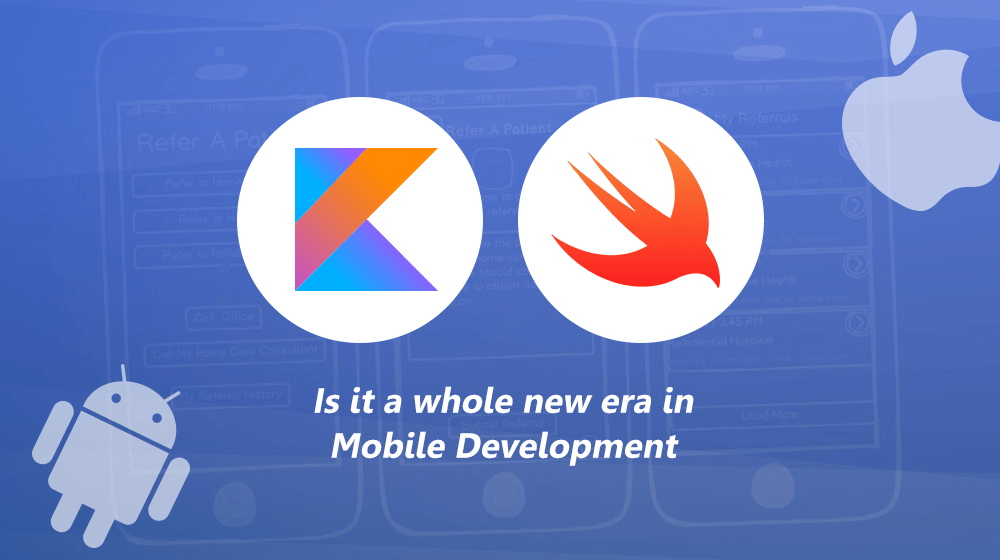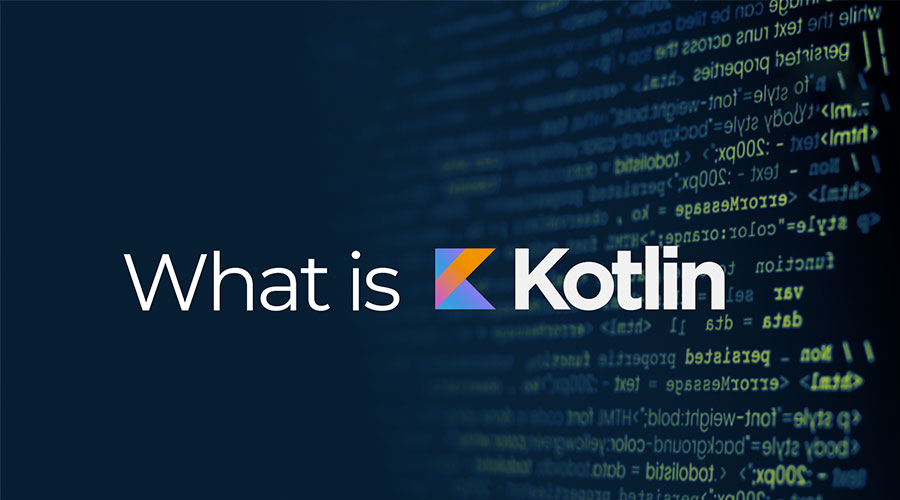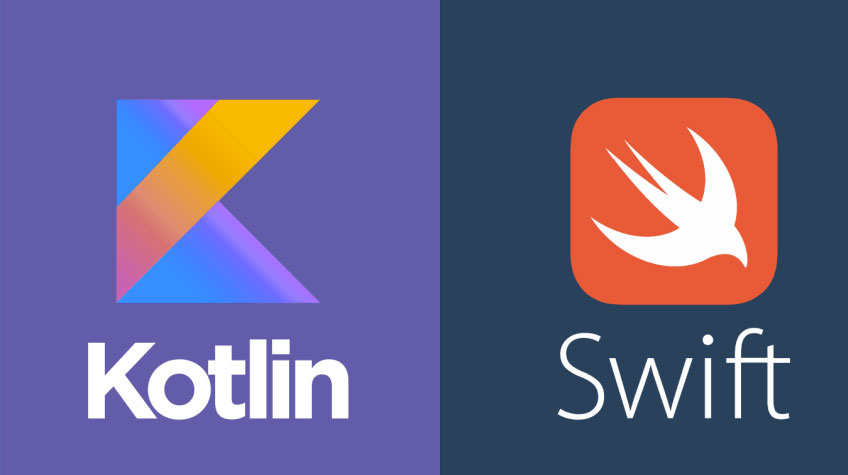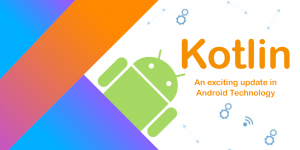
Mobile app development is in the mainstream today. Almost every company, big or small, is trying to come up with its own mobile application for Android and iOS users. As the mobile market continues to expand, app developers with expertise in Android and iOS couldn’t be in a better position.
Research indicates that there are over 5.48 billion smartphone users in the world. The augmented reality and virtual reality market reached around $209.2 billion in 2022. Aside from that, artificial intelligence (AI), the Internet of Things (IoT), Blockchain technology, and chatbots are all becoming increasingly commonplace.
In such a situation, developers need to master the newest languages to stay competitive. Many new languages have been introduced for both Android and iOS in recent years, ushering in a new era for native mobile app development. Kotlin and Swift are two such languages.
In this post, we shall discuss everything about Kotlin and Swift.
So, if you’re wondering how these two languages (Kotlin and Swift) are taking mobile app development to the next new level, then read this post.
So, let’s get started…
Table of Contents
- What is Kotlin?
- How Does Kotlin Help in Mobile App Development?
- Benefits of Using Kotlin In Android App Development
- Simpler Coding
- Extremely Free of Bugs
- Support for Integrated Development Environments and other Tools
- The Code Is Simple To Read
- Secure Language
- Well-supported Functional Programming
- Streamlines Common Programming Chores
- Reduced Programming Mistakes
- Community Support
- What is Swift?
- How Does Swift Help Developers Create Stunning iOS Apps?
- Top Benefits of Swift Programming Language for iOS
- Safety
- Brief and Evocative Syntax
- Quick
- Cross-Platform
- Intuitive
- Easily Accessible
- Free of Bugs
- Simple Upkeep of Code
- Interoperability with the Objective-C language
- Adaptive
- Why Should you Bother Learning these Two Programming Languages?
What is Kotlin?
Kotlin is an open-source programming language created to develop Android applications. The JetBrains Team, who also created Android Studio, created and released Kotlin. In 2016, Kotlin was released to the public. A large portion of JetBrains’ codebase was discovered to be written in Java. Therefore, the company needed a new language that was compatible with Java before launching Kotlin.

Before releasing Kotlin, JetBrains also experimented with Scala. After evaluating and exploring several languages, JetBrains introduced their own programming language, which was determined to be practical, compatible with Java, high level, and was found easily compliable.
How Does Kotlin Help in Mobile App Development?
JetBrains’ Kotlin is a statically typed, open-source programming language that is supported by the Java Virtual Machine (JVM) and is based on the LLVM compiler architecture .
Android Studio, Netbeans, Eclipse, and IntelliJ are just some of the most well-known IDEs. Kotlin’s support means that all IDEs operate well with it.
When compared to other languages that run on the Java Virtual Machine (JVM), this is a major plus. The ability to swiftly convert a Java file to Kotlin in Android Studio is a great feature of Kotlin. Just drop in your existing Java file, and with a single click, you’ll have a Kotlin version.
Kotlin offers 100% interchange with Java, as it is designed to be an industrial strength object-oriented language. It’s simple for programmers to interact with Java libraries from Kotlin and vice versa. Since Kotlin and Java share the same bytecode, you can begin using Kotlin immediately with your current Java applications.
Therefore, the developer can keep using the existing Java code rather than starting from scratch by learning Kotlin. They can get started with a minimal set of user interface (UI) components and basic business logic.
Kotlin is easy to learn for the one who works with Java. It is very easy for developers to dive into coding in Kotlin.
Kotlin is used to create Android applications. When it comes to modeling functions, Kotlin’s Lambdas (a manner of representing a function) are a highly useful tool. Lambdas provide programmers with virtually limitless flexibility.
In addition to facilitating the creation of readable and maintainable source code, Kotlin’s robust library, Anko, provides a quick and type-safe method for creating dynamic Android layouts.
Anko is divided up into several subcomponents, including the Anko Commons, Anko SQLite, Anko Layouts, and Anko Coroutines. The Kovenant is another useful Kotlin library; it is simple and asynchronous and has support for Android, JavaFX, RxJava, and more. It’s simple to implement and cuts down on extra work.
Some of renowned businesses, including Uber, Amazon Web Services, Coursera, Pinterest, Telegram, and Netflix, use Kotlin.
Let’s now take a look at the top benefit of Kotlin…
Benefits of Using Kotlin In Android App Development
Undoubtedly, Kotlin is a great language. It was created to help developers create user-friendly Android apps. It is one of the most secure programming languages that developers use. Here are some of the top benefits of using Kotlin:
1. Simpler Coding
Kotlin often requires fewer lines of code to do the same task as Java, making it a more efficient language. Engineers will have an easier time writing, reading, and modifying code if these conditions are met. It offers conciseness-enhancing features like type inference, smart casts, data classes, and properties is encouraged.

2. Extremely Free of Bugs
Because of its ability to help programmers spot errors before they reach the runtime, Kotlin is quickly becoming popular among developers.
3. Support for Integrated Development Environments and other Tools
Kotlin offers comprehensive tooling support within the IDE, particularly in Android Studio 3.0. Formerly, Kotlin support required installing a separate plugin; however, in the most recent versions of Android Studio, the necessary development tools are already included. Increased developer productivity all the way from the language to the framework and the tools is possible thanks to this.
4. The Code Is Simple To Read
The statistical typing of Kotlin makes it simple to track down instances of a class or function being used. There’s no need to switch programs to get there. Kotlin prioritizes readable syntaxes, making it possible for reviewers with no prior experience with the language to find and fix bugs.
Kotlin’s functional programming features, such as zero-overhead lambdas and mapping, fold over Java’s standard collections to provide an efficient and flexible language. The type system of Kotlin allows you to distinguish between mutable and immutable collections.
Kotlin allows the use of markdown instead of HTML for creating API documentation. This makes writing the code a fun endeavor for programmers.
5. Secure Language
Because of its built-in safeguards against typical programming faults, Kotlin code is intrinsically safer. Kotlin prompts programmers to consciously consider how their code could fail, which in turn encourages them to create code that is more fault-tolerant.

6. Well-supported Functional Programming
Programming in the functional style simplifies and standardizes the approach to a wide variety of problems. The correct function types allow for a more succinct and explicit use of functional principles.
7. Streamlines Common Programming Chores
Kotlin provides a wide variety of helpful features that make common programming jobs easier. Parameter defaults, object declarations, extension functions, and many other such things fall under this category. The sum of these helps to reduce development times and make the code easier to maintain.
8. Reduced Programming Mistakes
Kotlin is useful because it can cut down on programming mistakes. This is especially important for the Kotlin compiler, which strives to fail quickly.
Finding bugs is substantially facilitated, and potential bugs may be avoided altogether with this method. The Kotlin compiler does a lot of checking before it finishes compiling, which means fewer bugs at runtime and less time spent fixing them.
9. Community Support
Kotlin’s enthusiastic community helps developers interact, share knowledge, and find solutions to problems. Kotlin programmers are provided with immense support by the Kotlin community. They get plenty of resources to master the language, making it a valuable resource for programmers.
What is Swift?
Swift is a programming language for building “Swift” apps for Apple’s iOS. Swift is relatively older than Kotlin. It was launched in the year 2014 by Apple. It is a highly effective and user-friendly programming language designed for Apple’s iOS, macOS, watchOS, tvOS, and Linux. It’s an open-source programming language that makes developing mobile apps for iOS, a breeze for developers.
It was developed using the LLVM compiler infrastructure to ensure compatibility with Cocoa and Objective-C. Swift provides developers with a framework in which programmers can employ a variety of programming paradigms and approaches. Swift’s syntaxes are expressive yet compact, making coding an enjoyable and engaging experience.
It has various cutting-edge capabilities that today’s developers find really appealing. In addition, it’s a big assist when it comes to creating apps that are quick, secure, and reliable. This programming language is compatible with all iOS devices that also feature OS X.
While it is not native to iOS 6 or OS X 10.8, it can use the same runtime as the current Objective-C system.
Object-oriented features like classes, protocols, and generics allow Cocoa and Cocoa Touch developers to collaborate easily and produce high-performance, feature-rich applications.
How Does Swift Help Developers Create Stunning iOS Apps?
To date, Objective-C has been the language of choice for creating iOS apps. However, developers have been on the lookout for a replacement language for Objective-C for quite some time.
Apple created Swift to work in tandem with their existing programming languages and frameworks, including Cocoa, X-Code, and Objective-C. It can be used to write, test, profile, and publish apps for Mac, iOS, tvOS, and watchOS, all within Xcode, an integrated development environment (IDE) for creating Objective-C programs.
This makes Swift a potent and convenient tool in your Cocoa app development toolkit. APIs written in Objective-C can be used in Swift and vice versa. This includes both the larger frameworks used by a system and any additional, bespoke code you may write.
Swift’s interoperability with Objective-C and the ability to use native Objective-C classes in Swift projects, as well as the ability to leverage established Cocoa development practices, is a major selling point for the language. It’s a free-for-all where you can combine Objective-C and Swift code to make a single app.
With this interoperability capability, updating your Objective-C apps to take advantage of the latest capabilities in Swift is a breeze.
Top Benefits of Swift Programming Language for iOS
Swift was developed to be a secure and user-friendly alternative to the more conventional Objective-C programming language. This language offers a great many benefits, some of which are as follows:
1. Safety
Swift was developed with the goal of being a safer alternative to C-based programming languages. As a preventative measure, Swift does away with entire classes of unsafe code. This makes it possible to write “cleaner” code that results in fewer runtime crashes.

Swift is more secure than Objective-C since it doesn’t rely on pointers (it is a method that exposes values giving developers better and direct access to data). If there are no pointers, then there is no security hole.
When using Swift, variables are initialized before they are used. Developers can also readily spot any problems in the code, which cuts down on the amount of time spent debugging and eliminates the possibility of producing code of poor quality.
2. Brief and Evocative Syntax
Swift’s syntax is easier to read, shorter, and more efficient than other languages. The typical syntax for calling methods and functions is a comma-separated list of parameters enclosed in parenthesis. Developers familiar with JavaScript, Java, Python, C#, and C++ can easily incorporate Swift into their workflow thanks to the language’s high readability.
3. Quick
Swift’s speed is one of its most noticeable characteristics. Swift reduces the amount of effort needed to create apps by providing a wide variety of object-oriented features such as type inferences, generics, operators, tuples, etc. When compared to other languages, such as Objective-C and Python, it actually performs quite well.
LLVM (Swift’s compiler framework) is responsible for translating assembly language into machine code and optimizing that code. This results in you using less code than you would if you were working in Objective-C, which speeds up the development process. Using Swift for both the back end and the front end of an app enables considerable code exchange and reuse, which speeds up the process of developing the app and reduces the amount of development work needed.
4. Cross-Platform
You can make use of this open-source Swift programming language on key platforms such as Windows and Linux. As a result, the language is particularly well-suited for use by mobile app developers. Even though Swift is compatible with different platforms, you will still require cross-platform text editors such as Atom or Sublime Text.
5. Intuitive
Swift is a computer language that was designed to be extremely user-friendly from the ground up. The code is made simpler in many ways, including more compact syntax and inferred type.
6. Easily Accessible
Swift is a programming language that is easily accessible and does not cost anything. It is an open-source programming language. It lets you have access to third-party tools, assistance when you require it, and a knowledgeable community of users that share your interests to assist you in mastering the language.
7. Free of Bugs
Swift is lauded for its superior error handling. Errors in Swift are represented by values of types that conform to the Error protocol. Swift’s enumerations can stand in for scenarios where it becomes possible to throw, catch, propagate, and manipulate recoverable errors.
By catching errors at compile time, programmers can avoid the need for extensive testing and keep their apps from crashing.
8. Simple Upkeep of Code
Maintainability and readability of codes are the two most important factors in making them manageable. Swift’s unified files make great use of immutable data structures, leading to higher code quality and greater application stability.
In addition to lowering coupling, this would also increase code reuse and make programming more pleasurable. Additionally, the integration expenses are modest, and code maintenance is simple.
9. Interoperability with the Objective-C language
Interoperability with the Objective-C language is what makes Swift one of the best languages for developing unique iOS apps. Whether you want to build a new application with Swift or integrate new features and functionality into your existing project using Swift code, it does it all seamlessly.
Swift code can coexist with existing Objective-C files in the same project, giving you full access to your Objective-C API. This makes it simple to embrace Swift as a programming language.
10. Adaptive
Swift is functional programming friendly means that developers may work with immutable data and no hidden or implicit state to create pure object-oriented applications. It helps with code promotion without affecting any variables in any way.
Related Posts: Latest Trends in PHP Development
Why Should you Bother Learning these Two Programming Languages?
With more and more businesses coming up with their apps, app development has become an integral part of any business. With the rapid expansion in app development, a need for new languages has arisen. A large number of Android and iOS app developers are switching from Objective-C and Java to Swift and Kotlin.

Easy coding, shorter development times, and faster code execution due to dynamic libraries are just a few of the ways in which these new languages benefit both organizations and programmers.
The requirement for businesses to adopt new languages to maintain their position in the job market forces developers to adapt to the ever-shifting demands of the industry.
So, if you’re planning to try your hands at app development or are willing to hone your skills, then these two languages can be really helpful for you.
And if you’re a business owner planning to launch your own app, you can consider these languages to create unique mobile apps.
Of course, the final decision will be based on the mobile platforms you intend to create apps for.
The Bottom Line…
So, that’s all about Kotlin and Swift programming languages. Both of these languages are great in their own way. They help developers create stunning Android and iOS applications.
Both of these programming languages come with their own unique set of characteristics that set them apart from one another.
The best thing about these two apps is that they are easy to master and utilize in the production of mobile app development. These languages are a MUST for those who want to excel in mobile development and stay ahead in the game!
If you want to know more about these languages or are seeing expert Kotlin and Swift app developers, contact WeeTech.
WeeTech is a one-stop shop for all your web and mobile app development. We have a team of expert Kotlin and Swift programmers with extensive knowledge in the field. We can help you develop a unique app for your firm that stands out!
Contact WeeTech NOW!






